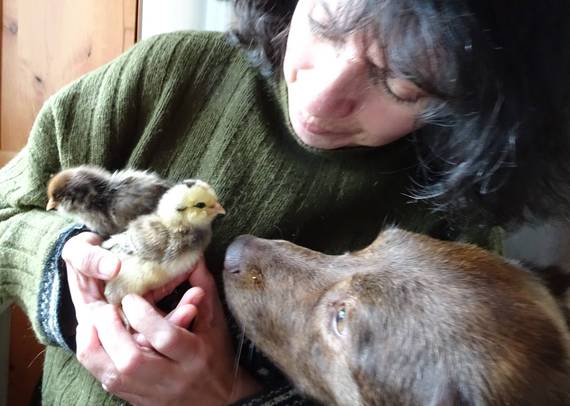In a thoughtful interview with Sam Mowe, The Sixth Extinction's Pulizer-winning author Elizabeth Kolbert responds to a question about spirituality. She speaks of spirituality in a broad sense, as meaning thoughtfulness and restraint.
I have had to think about my response to the word spirituality because people ask me, too, about it. I was raised Catholic by non-devout parents, became "spiritual" in my teens, then became secular (non-theist).
"Spirituality" is usually thought of as a religious thing, especially as a sense of connection to God or disembodied existence. Because I am secular and because many people clearly feel deeply spiritual (as I feel, say, at night on the ocean), I've had to ask myself: What, in the absence of a god, is that feeling of spirituality that our minds create? This seems a murky question but the answer I came up with is simple. In how I see and feel it, spirituality is our emotional connection to what is larger than ourselves. It's invoked by our sense of connection to the vastness of space, the depth and breadth of past and future time, the things bigger than us. It's that perspective-setting apprehension (a word I like for its double-duty as perception and uncertainty) of our place in vast continua. Our sense of the beautiful time-tuned wisdom of nature, the sacred improbability of Life, the mysterious beauty of music and our love for people--all these sorts of things qualify, to me, as spiritual. And that is how they feel to me.
Scrolling down from that interview to another thing that caught my eye I found this:
...the Dalai Lama said, "First, manage your inner world." This is the self-management that is key to emotional intelligence. Mindfulness is a tool for managing oneself. He then said, "Turn toward others with empathy and compassion." And, finally, he said, "Act for the greater good."
Spirituality as empathic. Empathy in action.
One of the things that kept coming up for me while writing Beyond Words was the lack of standard definitions for important concepts like self-awareness, love, empathy, consciousness--. I had to make my own definitions so that readers (and I) could know what I was talking about. (A lot of arguing seems to happen because people use the same term but think of it differently. They appear to be having one argument but they are having two separate debates with one another, talking past each other because the concept they are debating means two different things to them.) In thinking about some animals' capacity for empathy, I came up with three kinds of empathy on a continuum. There's what I call basic empathy or mood-matching, which is the mind's ability to match moods with companions. If they are relaxed, alarmed, or in a hurry, your mind syncs up. I think all animals who live in groups have and need this capacity. Slightly more removed is sympathy, the ability to understand another's mood. You are hurt or sad and your dog, who is neither hurt nor sad, comes to see what's the matter. Or you say, "I'm sorry to hear that your grandmother died." You don't share the same pain, but you understand another's pain or grief. Sympathy can often lead right into an urge to help. And if you are motivated to act, to help, I call that compassion.
These aspects of empathy apply in my own response to another question Sam Mowe asked, how writers handle the emotional pain of some of the subjects we write about. And Kolbert's answer--that the world is beautiful--takes us back to the top, to spirituality, our sense of our place in a world so wondrous, and what it at stake.
Anyway--coda--these are just some thoughts on this morning of what happens to be a major spiritual holy day for millions. In our living room warmed by our wood-burning stove this chilly morning, Patricia and I are celebrating not just with our Sunday bagels and the Times, but with our duly secular sacred holiday food: purple marshmallow Peeps. (Like any true religious ritual, Peeps call forth courage and sacrifice and make us think deeply about why we do this.) Helping Patricia and I celebrate in holiday fashion are six little chicken chicks in a doggie crate who will become our egg-layers for the next half-dozen or so years, our two doggies themselves, our two parrots and our kingsnake, Frankie. If that's not spiritual, I don't know what is. Out of kindness and compassion, no animals were subjected to eating a Peep during the making of this essay.


